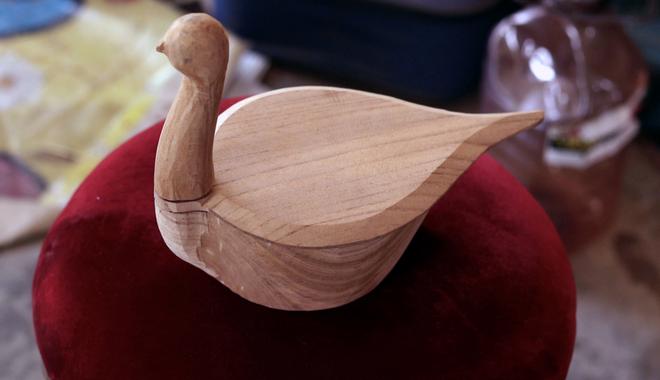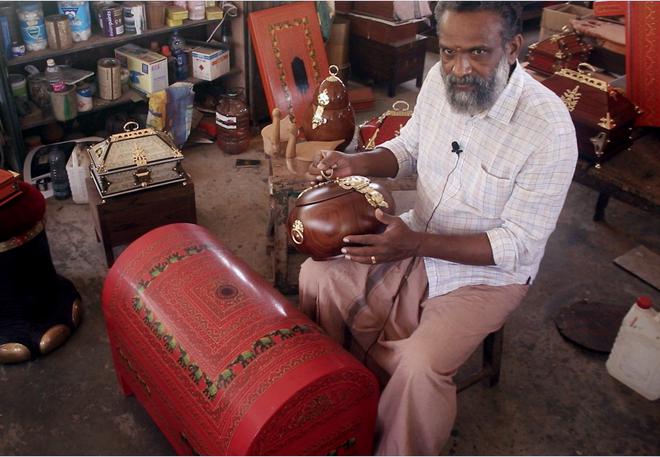It was thinking out of the box that helped VV Suresh Kumar give a new lease of life to different kinds of traditional wooden boxes made in Kerala.
Ari petti (to store grains), arrappu petti (to keep spices for daily use), kaal petti, (for elders to keep their clothes and documents in) and kai petti, a slim briefcase-like box with compartments, carried by karyasthan (manager) of a wealthy landlord or merchant, have all got takers. Marunnu petti (medicine box) was a common fixture in Ayurveda dispensaries. With multiple drawers, it was used to store medicines, herbs and powders.
Instead of making them only in teak or rosewood, as in the past, Suresh now makes the boxes in jack, wild jack and mahogany also.
In the sixties and seventies, his father Viswanathan Achari, a master craftsman, revived the Nettoor petti from the brink of extinction. Suresh recalls that his father had held training sessions to teach craftsmen to make the Nettoor petti under a project of the Government of Kerala.
Used by wealthy families and aristocrats to store valuables and ornaments, the Nettoor petti, also called the aada petti, usually made of teak and rosewood, was ornamented with brass and had compartments and secret chambers inside. However, the box fell into disuse due to the increasing use of metal cupboards and lockers.
Showing a Nettoor petti which he believes is around 250 years old, he says the owner has given it to him to restore it. “Once, it was covered with beautiful paintings that resembled murals in Kerala. However, someone who had it polished has erased most of the delicate work. It is in perfect working condition. I am trying to restore the painting and polish the brass carvings on it,” says Suresh.

Instead of simply replicating the boxes of yore, Suresh has given it a new look for present-day buyers. So, the Nettoor petti and Aatta petti come with paintings in different colour palettes. “While some customers insist on maintaining the old look, there are others who want it to be painted with mural-like work. Some want us to carve the boxes. We customise it for them,” he explains.
Makeover for the Nettoor petti
In its making too, the Nettoor petti has changed . Taking an old, faded and unpolished box, he shows how the lid was made from a single piece of wood with no joint at all. The box too has been made from a single piece of wood and the compartments were carved inside, thus obviating the need for any joint. “These are difficult to make because the wood has to be hollowed from inside to make these. The labour and time spent on it would not be commensurate with the price it might fetch us. So, we join four pieces of wood for the lid, which resembles the roof of traditional houses in Kerala,” he explains. The cost of the boxes begins from ₹2,500.

However, Suresh is not sure how the Nettoor petti got its name. Nettur exists in Ernakulam and Kannur districts in Kannur and in Tirunelveli district in Tamil Nadu. “Once, several places in Tirunelveli were a part of erstwhile Travancore. My father is from Neyyattinkara in the south of Thiruvananthapuram. Perhaps our ancestors came from Tirunelveli a long time ago.”
Another interesting creation is the cheppu (round or cylindrical container with a lid) that is made from the root of trees. The thick part of the root is taken and hollowed out to shape it and then ornamented with brass strips and carvings.

In 2014, Suresh was commissioned to make an ornamental box to carry the relics of Saint Chavara Kuriakose Elias and Saint Euphrasia to Rome for canonisation by Pope Francis at the Vatican. Special ornamental boxes with glass on all four sides were made for the occasion. “It was a proud moment for us!” he shares.
At present, Suresh has an outlet at Kerala Arts and Crafts Village in Vellar, near Kovalam, which is managed by his brother VV Ramesh Kumar. Although the lockdown was a difficult time for craftsmen, the government gave them a helping hand with innovative schemes for gifting during Onam last year.
“Things are looking brighter now with the economy gradually opening up. We hope that youngsters learn the craft to keep up the legacy of our master craftsmen,” says Suresh.







